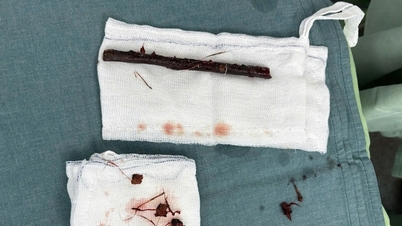Keep a food diary, walk after meals, don't skip breakfast, and choose healthy fats to help keep blood sugar levels stable after each meal.
Blood sugar (blood glucose) levels tend to rise after eating, because insulin secretion is not enough to reduce glucose levels.
High blood sugar causes unpleasant feelings such as dizziness, difficulty concentrating or thinking clearly, fatigue, shortness of breath, and anxiety. This condition, if left untreated, can lead to heart disease, kidney disease, stroke, or other dangerous health complications.
Some of the following ways help control blood sugar spikes.
Keep a food diary: Diabetics should know which foods and drinks increase blood sugar easily, and limit or eliminate them from their menu. Information should be recorded such as food portions, carbohydrate content, and medications taken before and after meals to compare with changes in blood sugar levels.
Patients should limit sweets, white bread, rice, pasta and potatoes as they tend to trigger cravings.

Keep a food diary to limit foods that easily increase blood sugar levels. Photo: Freepik
Check blood sugar before meals : The American Diabetes Association (ADA) recommends that diabetics check their blood sugar right before meals and about 1-2 hours after meals. This will help them make appropriate adjustments as soon as possible.
Using fast-acting medications: Patients who are taking insulin or prescription medications may need to inject insulin when their blood sugar levels spike after a meal. Insulin usually works to reduce blood sugar quickly, within about 30 minutes.
Change fat : Limit or completely eliminate foods related to fat such as butter, animal fat, chicken skin, fried potatoes to help control diabetes. Should increase healthy fats such as olive oil, canola oil...
Don't skip breakfast : Patients who don't eat breakfast are more likely to have high blood sugar after lunch and dinner. You should drink a glass of water after waking up and have breakfast an hour later. A varied menu including protein (eggs, low-fat cheese, poultry), and fiber helps stabilize blood sugar throughout the morning.
Take a walk after dinner: This healthy habit helps promote digestion, burns excess glucose from the meal, beneficial for diabetes management goals.
Anh Chi (According to WebMD )
| Readers ask questions about endocrine diseases - diabetes here for doctors to answer |
Source link


![[Photo] President Luong Cuong receives President of the Cuban National Assembly Esteban Lazo Hernandez](https://vphoto.vietnam.vn/thumb/1200x675/vietnam/resource/IMAGE/2025/9/30/4d38932911c24f6ea1936252bd5427fa)

![[Photo] The 1st Congress of Phu Tho Provincial Party Committee, term 2025-2030](https://vphoto.vietnam.vn/thumb/1200x675/vietnam/resource/IMAGE/2025/9/30/1507da06216649bba8a1ce6251816820)
![[Photo] Panorama of the cable-stayed bridge, the final bottleneck of the Ben Luc-Long Thanh expressway](https://vphoto.vietnam.vn/thumb/1200x675/vietnam/resource/IMAGE/2025/9/30/391fdf21025541d6b2f092e49a17243f)
![[Photo] General Secretary To Lam, Secretary of the Central Military Commission attends the 12th Party Congress of the Army](https://vphoto.vietnam.vn/thumb/1200x675/vietnam/resource/IMAGE/2025/9/30/9b63aaa37ddb472ead84e3870a8ae825)
![[Photo] Solemn opening of the 12th Military Party Congress for the 2025-2030 term](https://vphoto.vietnam.vn/thumb/1200x675/vietnam/resource/IMAGE/2025/9/30/2cd383b3130d41a1a4b5ace0d5eb989d)
































































































Comment (0)